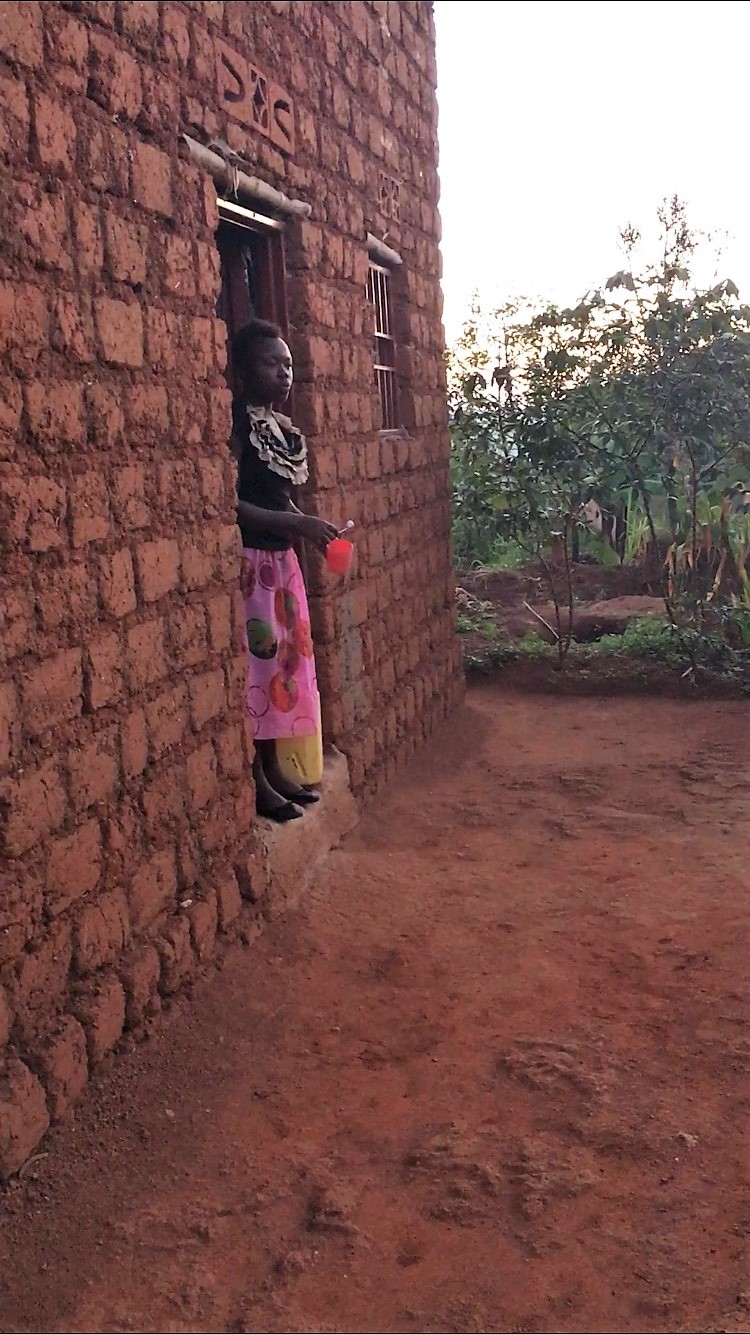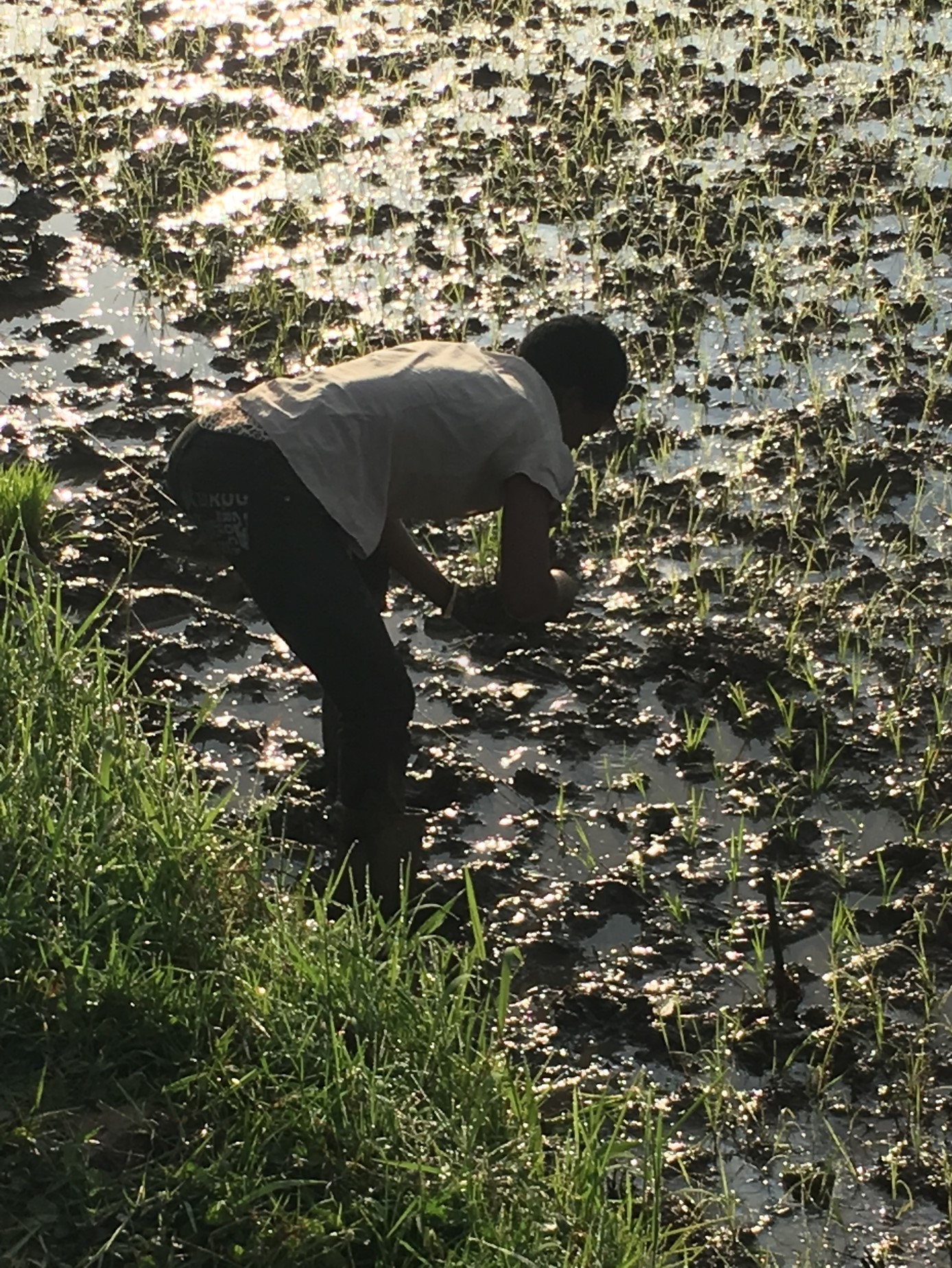On the Ground in Rwanda: Experiencing the ‘Extra’ in the Ordinary
To the casual observer, Violet Mukamukangahe is an uneducated farmer eking out a simple living. It takes spending a day with her to realize just how extraordinary she is.
With grit, hard work and a little help from her friends at Opportunity International, this 35-year-old tends her rice and sweet potato fields, educates her three children and built a home with her own two hands.
I met Violet while on a trip with our partner of 25 years, the Caterpillar Foundation, to capture on video the stories of Opportunity’s agricultural and education finance clients in Rwanda. We were also there to raise awareness of the value of water and the impact of the global water crisis on community health, education and economics.
Let me take you on the journey with us.
It’s 4 a.m. and pitch black outside as we travel from Kigali, Rwanda's capital and largest city, to Violet’s home and farm in Muhanga—nearly two hours away. Our local driver, Didier, hears me yelping in the back due to the bumpiness of the road and calls out “African massage!” As we travel throughout the countryside every day, we will receive many African massages.
Accompanying us is an insanely talented videographer, a Caterpillar Foundation representative, my colleague John Magnay, who heads up Opportunity’s Agricultural Finance program, and a local field officer named Daniel who translates from English to Kinyarwanda, the local dialect.
As we make our way down a rocky mud pathway, the van finally stops in front of a very modest home owned by Violet. She is one of 527 women in a farming cooperative called KIABR, which is supported by the Opportunity International/Caterpillar Foundation partnership. Here, we provide smallholder farmers like Violet with specially tailored agricultural finance tools and training to equip them to move from subsistence to commercial farming. Helping farmers increase their yields and productivity and raise household incomes is crucial to ending hunger and malnutrition in rural areas, breaking the cycle of poverty and transforming lives.

Violet comes out to greet us and mentions that her children have spent the night at her mother’s house next door. When asked if she prefers us to film at her mom’s home, she responds with a resolute “no.” It’s obvious she wants this done at the home she has built and paid for with her own hard work.
As the videographer sets up her equipment, we enter the mud-brick home with dirt floors and a tin roof. Electricity is in the form of two hanging light bulbs in each of the two rooms. There is no running water or furniture, just a sleeping mat with a mosquito net hanging over it.
Suddenly, we hear snorting coming from one of the rooms. “Is that swine I hear?” asks John.
Through the translator, Violet explains there is an increased demand for pork by the expatriate community, hotels, and urban people, so she is thinking of starting a piggery. “I don’t usually keep the pig inside the house,” Violet says. “But this week, when I was working at the rice farm, someone stole my goat. And I didn’t want the same to happen to my pig.”
Violet introduces us to her 17-year-old daughter Harriet, who has finished junior secondary school (through ninth grade) and is now attending a technical school to learn to tailor. Our videographer films Harriet getting ready for school. To brush her teeth, she fills a pink plastic cup with clean water from a jerry can that holds 5.3 gallons of water. When she is done, Harriet carefully pours the leftover water back into the jerry can…and we soon learn why. Without any running water, she and Violet must carry empty jerry cans several kilometers down a steep hill to a protected spring and then haul the filled cans--each weighing 40 pounds—back up to their home. They spend hours every day going up and down the hill to collect water for the family.
After Harriet goes to school, her mom walks us to her rice field located in a marshland near the protected spring. We watch Violet as she transfers pre-germinated seedlings from the corner of her seedbed to the wet field. This is an effective method for controlling weeds and growing better rice. However, the labor-intensive process requires Violet to be bent over in the marsh most of the day. What strikes me is how perfectly she hand-plants each seedling in a straight row.

Next, we meet the President of KIABR Coop Valence Nizeyumukiza and his water irrigation system manager. John flies a drone above the hundreds of rice fields as water comes rushing out of the pipe and floods the co-op farmers’ fields. We learn how crucial the equitable distribution of water is to growing rice, particularly during the dry season and in fields located at the lower end of a marshland. When we watch some of the video filmed earlier, it’s easy to compare the lush green zones in Violet’s area to the brown and dead rice zones without access to the water irrigation system.
As we make our way back to the hotel, I am overcome with emotion thinking about Violet’s drive, determination, and perseverance. I’m incredibly grateful for the opportunity to meet her, and at the same time, to see how the work we do in Chicago has an impact around the world.
In a world of consumerism and constant one-upping on social media, it’s sometimes hard to remain grounded. Since seeing the faces and hearing the stories of our clients in Rwanda, I have started to practice daily gratitude for things I once took for granted—like clean water pouring out of my faucet.
Back at home in Chicago, my heart sings when I receive a picture of Violet in front of her home and see that the mud-brick has been finished with cement! This woman is a warrior.
.png)
Since 1994, the Caterpillar Foundation and Opportunity International have contributed to the quality of life, health, and sustainability in the communities they serve, addressing vital water and sanitation issues, and transforming millions of lives through financial services, agriculture innovation and training around the world.
Caterpillar Foundation’s support has allowed Opportunity International to create jobs, equip farmers to feed more people, provide vulnerable children with a hopeful future and help low-income communities thrive.
I am most grateful they’ve chosen to build a strong bridge with us that is leading good, decent, hard-working people like Violet out of dire poverty around the world.
If you're interested in seeing more about about our trip, here are two videos that capture our clients and their experiences with water and education.